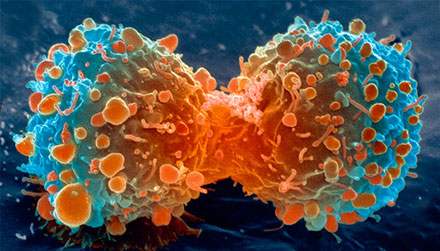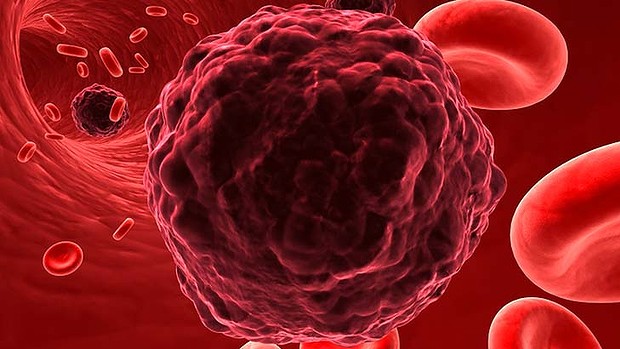One Man, One Disease,
And a Medical Revolution
Paul Marks, M.D.
James Sterngold
(Public Affairs)
Cancer represents a divine irony: it causes death by cells that won't die in individuals who wish they could be immortal. And the toll of these dividing cells is impressive.In 2013 alone, it is estimated that cancer was diagnosed in 1.6 million people in the United States and was the cause of death in more than 580,000. While remarkable progress has been made in preventing and treating cancers, it is still a diagnosis to be feared. The word itself has so many negative connotations that if you want to hurl an epithet at somebody you need only compare them to a cancer.
However, in scientific circles, as our knowledge continues to expand rapidly, the word "cancer" is being replaced by more precise and often more benign terms. Moreover, many cancers that were once fatal can be successfully treated or even cured. Other cancers (that are now regarded as only cells that look "abnormal") are managed with "watchful waiting." Still others never reach the malignant stage because of effective prevention strategies.
Taken together, these advances represent a revolution in our understanding of the mechanisms of cancer and the tools now available to fight it. A history of these extraordinary advances over the past forty years is the subject of this new book, On the Cancer Frontier: One Man, One Disease, and a Medical Revolution by Paul A. Marks, M.D. and James Sterngold.
Dr. Marks is President Emeritus of Memorial Sloan-Kettering Cancer Center in New York City and a researcher who played a prominent role as both a scientist and advisor on national cancer policy. His co-author is a senior writer for the Wall Street Journal and was, previously, a correspondent at the New York Times.
Although there were important discoveries into the nature of cancer dating back to the late 19th Century, there was no comprehensive, coördinated marshaling of resources until the early 1970s. This changed with President Nixon's State of the Union address in 1971 in which he called for $100 million to find a cure for cancer. This was the beginning of what we now think of as the "war on cancer." To many scientists' chagrin, however, this was framed as nothing more than another target for American know-how, similar to splitting the atom or landing a man on the moon. All that was needed was the right leadership and a lot of money.
What's more, the war imagery was misleading. For one thing, it implied that there was a World War II-style battlefield that could be conquered by a frontal assault. For another, it suggested that cancer was a single enemy with a stable personality profile. As it turns out, the reality was far more complex and subtle.
We now know that there is not just one cancer but over 150 different varieties. Perhaps more surprising is the fact that cancer cells are mutable and can adjust their metabolic pathways (read: survival strategies) in response to targeted therapies.
Thus, some cancers seem to get "smarter" with time which means scientists need to constantly tweak their offensive plans. Instead of a conventional war like we saw in the 60s and 70s, we find the "war" closer to a 21st Century insurgency with an enemy that can learn on the fly.
Marks reports that "basic research has been the engine for most of the successes in the war on cancer,"
But the clever deceptions of cancer can overcome even the best science. Developing anticancer drugs is not like shooting at a fixed target; it is more like dealing with an insurgency that constantly learns from its losses and adapts to any new defensive strategy. It is a battle against a foe that is just as smart as we are.
On the Cancer Frontier however is not just about cancer. It is also about Dr. Marks. For this reason, it reads, at times, more like a personal memoir than a medical history. And the immodest subtitle, One Man, One Disease, and a Medical Revolution implies an outsized role for Marks in these battles. Although he made important contributions as a strategist and foot-soldier, no one needs to be reminded it is not a one-man struggle.
While he showed early promise as a researcher, it is as an educator and administrator that Marks will be remembered. As a relatively young faculty member, he was recruited to become Dean of the prestigious medical school at Columbia University. A short time later he was tapped by policymakers in Washington to be one of three members of the first Presidential Cancer Panel.
Still later he was appointed president of Memorial Sloan-Kettering Cancer Center which became --- in the opinion of many observers --- the preeminent cancer center in the world. Although he can be justifiably proud of his role in this "war," there seems to be a tinge of regret that he wasn't able to grab the ultimate brass ring: a Nobel Prize. He did, nevertheless, rub shoulders with many who did --- including several former students who have acknowledged his influence on their careers.
For the general reader who would like an overview of the war on cancer, this is a useful place to begin, although, curiously, there is no glossary, list of references or an appendix on sources. Despite these quibbles, the writing is fresh and accessible with enough detail to satisfy someone who wants a deeper understanding of the mysteries embedded in cancer cells. There are also a number of wonderful examples of how unexpected insights have led to life-saving therapies.
Finally, the authors describe discoveries that are simultaneously amazing and depressing to contemplate. Consider the following:
The typical cancer cell has, on average, forty-five abnormalities in the genes and cell pathways that can drive the unrestrained growth of the tumor.
Or this,
Researchers have found that 99.9 percent of the DNA in cancerous tissue may be identical to the DNA in the normal surrounding cells. That 0.1 percent difference may contain the information that kills, but which altered genes should the researcher or physician target in the patient?
And finally,
Not only are we finding dozens, if not hundreds, of different genetic mutations in tumors, but there are different kinds of cancer cells with different abnormalities in the tumor of any one patient.
As these and other examples illustrate, there is enough balance in On the Cancer Frontier to help a reader understand why --- despite many victories and huge amounts of cash --- total conquest is still nowhere in sight.
--- Larissa BelmondoGo to three recent book reviews
on the same subject
Mortality
Christopher Hitchens
[Sic] A Memoir
Joshua Cody
Most of Me
Robyn Michele Levy

